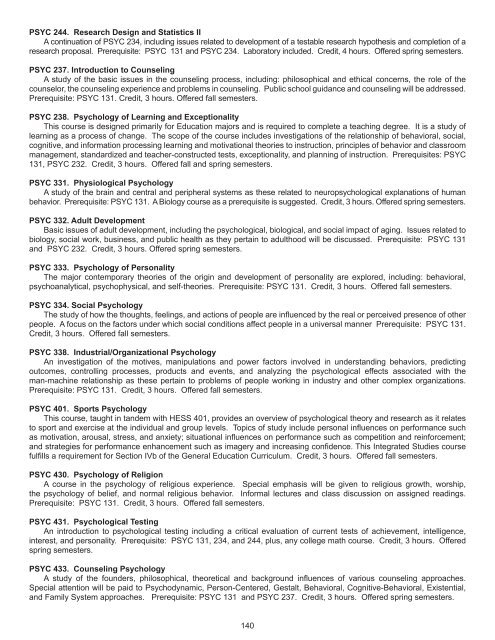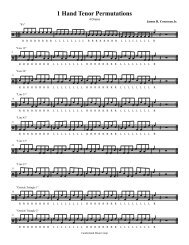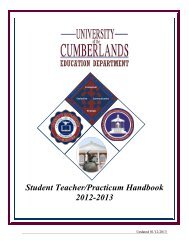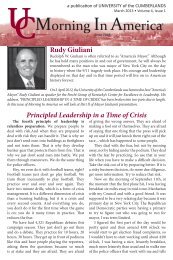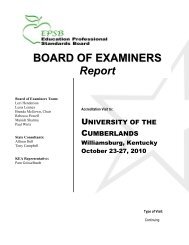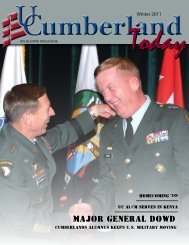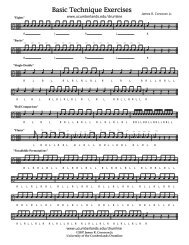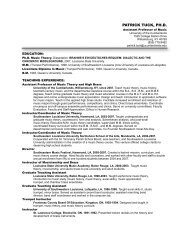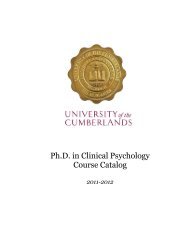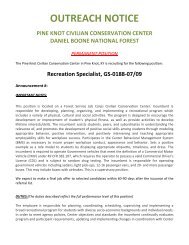2013â2014 Undergraduate Catalog - University of the Cumberlands
2013â2014 Undergraduate Catalog - University of the Cumberlands
2013â2014 Undergraduate Catalog - University of the Cumberlands
You also want an ePaper? Increase the reach of your titles
YUMPU automatically turns print PDFs into web optimized ePapers that Google loves.
PSYC 244. Research Design and Statistics II<br />
A continuation <strong>of</strong> PSYC 234, including issues related to development <strong>of</strong> a testable research hypo<strong>the</strong>sis and completion <strong>of</strong> a<br />
research proposal. Prerequisite: PSYC 131 and PSYC 234. Laboratory included. Credit, 4 hours. Offered spring semesters.<br />
PSYC 237. Introduction to Counseling<br />
A study <strong>of</strong> <strong>the</strong> basic issues in <strong>the</strong> counseling process, including: philosophical and ethical concerns, <strong>the</strong> role <strong>of</strong> <strong>the</strong><br />
counselor, <strong>the</strong> counseling experience and problems in counseling. Public school guidance and counseling will be addressed.<br />
Prerequisite: PSYC 131. Credit, 3 hours. Offered fall semesters.<br />
PSYC 238. Psychology <strong>of</strong> Learning and Exceptionality<br />
This course is designed primarily for Education majors and is required to complete a teaching degree. It is a study <strong>of</strong><br />
learning as a process <strong>of</strong> change. The scope <strong>of</strong> <strong>the</strong> course includes investigations <strong>of</strong> <strong>the</strong> relationship <strong>of</strong> behavioral, social,<br />
cognitive, and information processing learning and motivational <strong>the</strong>ories to instruction, principles <strong>of</strong> behavior and classroom<br />
management, standardized and teacher-constructed tests, exceptionality, and planning <strong>of</strong> instruction. Prerequisites: PSYC<br />
131, PSYC 232. Credit, 3 hours. Offered fall and spring semesters.<br />
PSYC 331. Physiological Psychology<br />
A study <strong>of</strong> <strong>the</strong> brain and central and peripheral systems as <strong>the</strong>se related to neuropsychological explanations <strong>of</strong> human<br />
behavior. Prerequisite: PSYC 131. A Biology course as a prerequisite is suggested. Credit, 3 hours. Offered spring semesters.<br />
PSYC 332. Adult Development<br />
Basic issues <strong>of</strong> adult development, including <strong>the</strong> psychological, biological, and social impact <strong>of</strong> aging. Issues related to<br />
biology, social work, business, and public health as <strong>the</strong>y pertain to adulthood will be discussed. Prerequisite: PSYC 131<br />
and PSYC 232. Credit, 3 hours. Offered spring semesters.<br />
PSYC 333. Psychology <strong>of</strong> Personality<br />
The major contemporary <strong>the</strong>ories <strong>of</strong> <strong>the</strong> origin and development <strong>of</strong> personality are explored, including: behavioral,<br />
psychoanalytical, psychophysical, and self-<strong>the</strong>ories. Prerequisite: PSYC 131. Credit, 3 hours. Offered fall semesters.<br />
PSYC 334. Social Psychology<br />
The study <strong>of</strong> how <strong>the</strong> thoughts, feelings, and actions <strong>of</strong> people are influenced by <strong>the</strong> real or perceived presence <strong>of</strong> o<strong>the</strong>r<br />
people. A focus on <strong>the</strong> factors under which social conditions affect people in a universal manner Prerequisite: PSYC 131.<br />
Credit, 3 hours. Offered fall semesters.<br />
PSYC 338. Industrial/Organizational Psychology<br />
An investigation <strong>of</strong> <strong>the</strong> motives, manipulations and power factors involved in understanding behaviors, predicting<br />
outcomes, controlling processes, products and events, and analyzing <strong>the</strong> psychological effects associated with <strong>the</strong><br />
man-machine relationship as <strong>the</strong>se pertain to problems <strong>of</strong> people working in industry and o<strong>the</strong>r complex organizations.<br />
Prerequisite: PSYC 131. Credit, 3 hours. Offered fall semesters.<br />
PSYC 401. Sports Psychology<br />
This course, taught in tandem with HESS 401, provides an overview <strong>of</strong> psychological <strong>the</strong>ory and research as it relates<br />
to sport and exercise at <strong>the</strong> individual and group levels. Topics <strong>of</strong> study include personal influences on performance such<br />
as motivation, arousal, stress, and anxiety; situational influences on performance such as competition and reinforcement;<br />
and strategies for performance enhancement such as imagery and increasing confidence. This Integrated Studies course<br />
fulfills a requirement for Section IVb <strong>of</strong> <strong>the</strong> General Education Curriculum. Credit, 3 hours. Offered fall semesters.<br />
PSYC 430. Psychology <strong>of</strong> Religion<br />
A course in <strong>the</strong> psychology <strong>of</strong> religious experience. Special emphasis will be given to religious growth, worship,<br />
<strong>the</strong> psychology <strong>of</strong> belief, and normal religious behavior. Informal lectures and class discussion on assigned readings.<br />
Prerequisite: PSYC 131. Credit, 3 hours. Offered fall semesters.<br />
PSYC 431. Psychological Testing<br />
An introduction to psychological testing including a critical evaluation <strong>of</strong> current tests <strong>of</strong> achievement, intelligence,<br />
interest, and personality. Prerequisite: PSYC 131, 234, and 244, plus, any college math course. Credit, 3 hours. Offered<br />
spring semesters.<br />
PSYC 433. Counseling Psychology<br />
A study <strong>of</strong> <strong>the</strong> founders, philosophical, <strong>the</strong>oretical and background influences <strong>of</strong> various counseling approaches.<br />
Special attention will be paid to Psychodynamic, Person-Centered, Gestalt, Behavioral, Cognitive-Behavioral, Existential,<br />
and Family System approaches. Prerequisite: PSYC 131 and PSYC 237. Credit, 3 hours. Offered spring semesters.<br />
140


